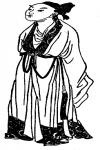Cao Zhi poet from China was born in 192, had 40 years and died in 232. Poems were written in Ancient mainly in Chinese language. Dominant movement is chinese dynasties.
Biography
Cao Zhi , style name Zijian, was a prince of the state of Cao Wei in the Three Kingdoms period and an accomplished poet in his time. His poetry style, greatly revered during the Jin Dynasty and Southern and Northern Dynasties, came to be known as the Jian'an style. Cao Zhi was a son of Cao Cao, a warlord who rose to power towards the end of the Han Dynasty and laid the foundation of Wei. As Cao Zhi once engaged his elder brother Cao Pi in a power struggle to succeed their father, he was ostracised by his victorious brother after the latter became the emperor and established Wei. In his later life, Cao Zhi was not allowed to meddle in politics, despite his many petitions to seek office.
Born in 192, Cao Zhi was the third son of the warlord Cao Cao and Lady Bian. According to the Records of the Three Kingdoms, Cao Zhi could recite the Shi Jing, Analects and more than ten thousand verses worth of poems before he even turned twenty. His literary talent made him a favorite son of Cao Cao in the early stage of his life.
However, Cao Zhi was an impetuous man with little self-discipline. He was also a heavy drinker. On the other hand, his older brother Cao Pi was a shrewd man who knew how to feign emotions at the right times. Cao Pi also enjoyed a much closer relationship to the servants and subjects around Cao Cao, and they spoke well of him. In 217, Cao Cao eventually picked Cao Pi to succeed himself. This further aggravated Cao Zhi's already eccentric behavior. He once rode his chariot along the road reserved for the emperor and through the front gate of the palace. This infuriated his father, who sentenced the chariot driver to death.
Having chosen a successor, Cao Cao took measures to emasculate other contestants. He did this by executing Yang Xiu, a chief advisor to Cao Zhi. This greatly unsettled Cao Zhi, but failed to jolt him back to his senses. On the contrary, he sank further into his drunken habits. In 219, Cao Cao's cousin and leading general Cao Ren was besieged at the fortress at Fancheng (樊城; present-day Fancheng District, Hubei) by Guan Yu. Cao Cao named Cao Zhi to lead a relief force to the rescue, in the hope that the task would instill into the latter a sense of responsibility. However, Cao Zhi was so drunk that he could not come forth to take the order. Cao Cao then gave up on this son.
Within months, Cao Cao died. One of the first things Cao Pi did was to do away with Ding Yi (丁仪) and Ding Yi (丁廙), two firm supporters of Cao Zhi. He also sent Cao Zhi, along with the other brothers, away from the capital (into a countryside estate) and prohibited them from taking part in central political issues.
Prospects for Cao Zhi did not improve after Cao Pi died in 226. He wrote to the second Wei emperor Cao Rui many times, seeking a position to apply his talents. In 232, he even sought a private meeting with Cao Rui to discuss politics. However, Cao Rui probably still considered him a threat to the throne and declined all the offers. Severely depressed by the setbacks, Cao Zhi soon died of illness, leaving behind instructions for a simple burial.






